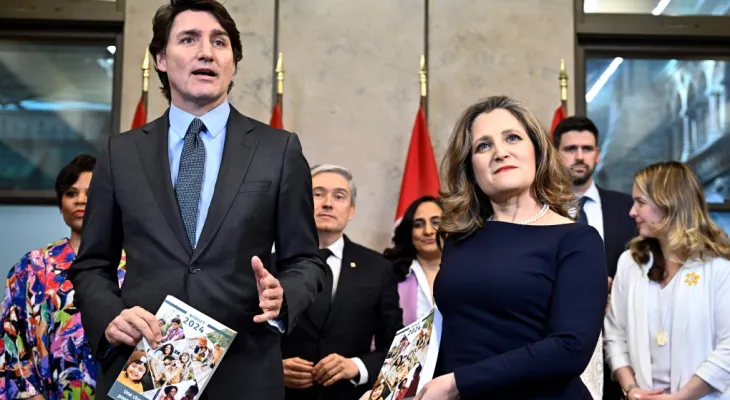Search here
Newspaper
Search here

Arab Canada News
News

Published: April 22, 2024
Denis Mathu and Stephanie Gordon started posting videos about financial advice on YouTube three years ago - a side project that helped unleash their creativity.
They never imagined it would lead them to some of Canada's most powerful political corridors.
Mathu and Gordon - known online as Steph & Den - were among many content creators invited to the federal budget lockup on Tuesday, where they gained early access to the new spending blueprint in Ottawa.
It's an invitation typically reserved for experts, stakeholders, and mainstream media. But federal Liberals are embracing content creators and influencers in their quest to reach disenchanted millennials and Generation Z voters, as well as others who consume information through social media.
Gordon, 27, said, "They see that we're building this audience and want to tap into that."
Steph & Den have a target audience aged 18 to 34 with 750,000 followers across multiple platforms. This includes TikTok, a popular video app that was banned on federal government devices during Prime Minister Justin Trudeau's administration due to privacy and cybersecurity concerns.
Reni Odetoyinbo, 27, who was invited by the Minister of Finance's office to the last two federal budgets, said, "They recognize that many young people are no longer watching the news; they're not following traditional media."
Especially for people my age. This is their main source of news.
Neither the Office of Finance Minister Chrystia Freeland nor the Prime Minister's Office was willing to answer questions about the strategy.
However, they stated that influencers do not get paid when invited to government events, including housing announcements in Toronto in the weeks leading up to the budget.
Mohamed Hussein, a spokesperson for Prime Minister Justin Trudeau, said it's about connecting with Canadians wherever they are.
Hussein said in a statement, "Canadians are consuming digital content more and more. As the media landscape grows, so too does our approach to how we communicate."
When the budget arrived on Tuesday, Danika Nelson, 33, documented the day on her Instagram account. She has 24,000 collective followers with a core audience aged 25 to 45.
Nelson and the other six financial content creators reviewed the budget before it was presented in the House of Commons.
They also met with several ministers, including Housing Minister Sean Fraser, Youth Minister Marci Ien, and Freeland, where they were able to ask questions.
Nelson posted on Instagram alongside behind-the-scenes videos and photos, saying, "What I appreciate in this conference is that they really want to make sure that we (as millennials and Gen Z) see ourselves in it, and if we don't, they want to dig deeper."
It was a political reach greater than what mainstream media received that day.
As they spend the coming days reviewing the budget, the creators will be developing content around it, focusing on topics of interest and answering followers' questions.
Gordon said, "It's very easy in the online world to see headlines and high-level information but not actually know how it applies to you."
"It creates some anxiety in people, because they're saying, what is the actual information I need to know? This is the piece that needs to be communicated more clearly to people."
The Canadian government is not alone. For many years, the White House has been briefing influencers on topics like the Russian invasion of Ukraine, inviting them to events such as the State of the Union address.
When U.S. President Joe Biden visited Ottawa last year, YouTube helped connect First Lady Jill Biden and Sophie Grégoire Trudeau with the group The Asphyxiation Girls for an interview about design. The resulting interview was uploaded to their YouTube page, which has more than 2.2 million followers.
YouTube said it’s common for the technology company to facilitate introductions between governments and content creators. The federal budget last year is an example of this, when Freeland's office asked the company to connect them with Canadian content creators focusing on finance.
This is how Odetoyinbo was invited to last year's budget, where she eventually created six videos breaking down the document to her collective 150,000 social media followers.
She said, "I think it's a really good effort on the government's part to reach people in a language they understand."
And although their followers acknowledge they don't read or watch traditional news, content creators say they're still hungry for what’s happening - as long as it's delivered through social media.
Mathu, 28, said, "Traditionally, this is one of those things that people tend to take lightly. But I think it's one of those things that is going to become more than just a trend."
Comments